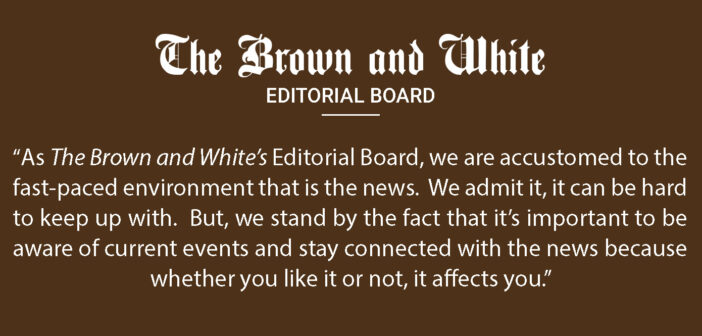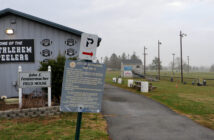It’s 9 p.m. on a Wednesday night. Editors are gathered in Coppee Hall’s newsroom at another press night to prepare for The Brown and White’s next print issue. Amid the concentrated silence comes a not-so-typical noise.
Eek—our heads turn as a bat comes into sight and begins weaving in between the ceiling beams. Though we can successfully get a newspaper out to our community twice a week, animal control isn’t exactly in our skillset.
“Let’s call the LUPD.”
Although the officer that came never found the bat, he left us with a question. And now we’d like to ask you the same thing: Where do you get your news?
As The Brown and White’s Editorial Board, we are accustomed to the fast-paced environment that is the news. We admit, it can be hard to keep up with. But, we stand by the fact that it’s important to be aware of current events and stay connected with the news because whether you like it or not, it affects you.
With this in mind, we encourage you to ask yourself this question. Think about it. What sources do you go to for your news? Do you read a paper? Do you go online? Do you find it on social media?
Regardless of your answers to these questions, there are a plethora of ways to get the news, but it’s most important that we get it somewhere.
A quick way to do so that many college-aged people take advantage of is enabling push notifications for news outlets on their phones. The kind that gives a short one-to-two sentence synopsis of the day’s most important stories.
This is a useful way to stay informed, especially for people on the go. However, those notifications can only give you so much information, and are typically telling national stories, rather than local ones. You won’t and can’t know the whole story from reading one sentence. And if that little bit of information is sensationalized, consumers leave with a distorted view of what’s happening.
Realistically, we recognize that, as college students, we may not usually have the time necessary to keep up with the day’s events by reading entire stories—especially when there are so many sources to look to and stories are often disheartening. It can feel like an oversaturation of information being thrown at us all at once.
With students’ plates already being full with school and studying in pursuit of a high grade, extra reading may begin to feel more like a burden than a service to yourself.
No matter what college you’re enrolled in, on top of homework, classes, jobs, clubs and more, staying up to date can feel overwhelming. There are only so many hours in the day—we get that, have you seen our deadlines?
Take advantage of the complimentary news subscriptions offered by Lehigh. You’re paying for tuition anyways—you might as well.
Read the national news and definitely read the local news. Reading the news creates informed citizens and informed voters. It is in the First Amendment after all, so it has to be important.
Take some time before you go to bed or after you wake up to skim through the day’s headlines and, to start, pick a story to read that pops out to you.
So, after asking yourself, “Where do you get your news?” we ask that you begin to prioritize being informed. At the end of the day, this may not always be realistic for your schedule, but it’s a useful and important goal to strive for.
After all, the news is always changing and in the end, it impacts you.
And for those with lingering questions about the bat, there have been no follow-up appearances, so we are probably wondering the same thing as you.






Comment policy
Comments posted to The Brown and White website are reviewed by a moderator before being approved. Incendiary speech or harassing language, including comments targeted at individuals, may be deemed unacceptable and not published. Spam and other soliciting will also be declined.
The Brown and White also reserves the right to not publish entirely anonymous comments.
1 Comment
Open doors and windows, the bat will find an exit.
By using TV, radio and daily newspapers you can get the major news. Papers typically give excellent investigative reporting for local happenings. Magazines and periodicals give a more in depth coverage of events and trends. It’s best to get varied information to be able to be familiar with all current information be it accurate, biased or blatantly false.
The Brown and White (B&W), as far as I can determine, does a great job of accurate factual coverage although it is sometimes biased as far as it’s choice of coverage and what it fails to address in that coverage.
Thanks for a thought provoking opinion piece.